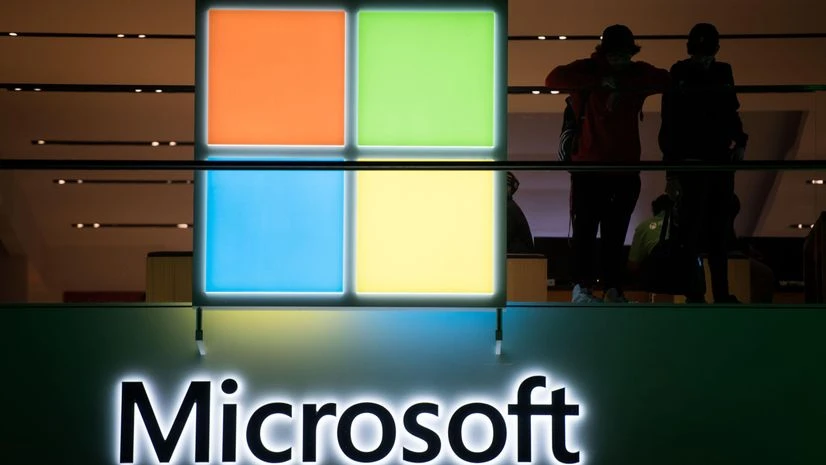Microsoft beat market estimates for quarterly profit and revenue on Tuesday, as new artificial-intelligence features helped attract customers to its Azure cloud service as they built out their own AI services.
But Microsoft shares were down 1 after-hours as investors absorbed news about rising costs to develop these AI features.
The company forecast operating expenses of $15.8 billion to $15.9 billion in the current quarter, up from $15.4 billion in the previous one. It also said it expects capital expenditures to "increase materially" on a sequential basis.
Microsoft, in collaboration with ChatGPT creator OpenAI, has pushed chatbots into its core products such as its Office software and Bing search engine over the past year, attracting business customers eager to try the tech industry's next breakthrough. Investor buzz over AI helped Microsoft's shares rise by 57 in 2023.
But this has also increased Microsoft's costs, and investors are watching growth in its Azure and Office business closely to see if that keeps up with the massive investments it plans to pour into data centers this year to deliver generative AI.
"We've moved from talking about AI to applying AI at scale," CEO Satya Nadella said in a statement. "By infusing AI across every layer of our tech stack, we're winning new customers and helping drive new benefits and productivity gains across every sector."
More From This Section
Brett Iversen, Microsoft's vice president for investor relations, told Reuters that 6 percentage points of the growth rate of cloud-computing platform Azure in the second quarter was attributable to AI. That is double the 3 percentage points in the first quarter.
There are now 53,000 Azure AI customers, a third of whom were new to the service in the past 12 months, Nadella told analysts on a conference call.
"Overall, we are seeing larger and more strategic Azure deals with an increase in the number of billion dollar plus Azure commitments," he said, without giving a time frame.
Total revenue grew 18 to $62 billion in the quarter ended Dec. 31, compared with the average analyst estimate of $61.12 billion, according to LSEG data. Adjusted profit of $2.93 per share beat an average estimate of $2.78 per share.
Revenue at Microsoft's Intelligent Cloud unit, which houses the Azure cloud computing platform, grew 20 to $25.9 billion.
Sales of Azure grew 30 - its best growth rate in four quarters - compared with a 27.7 consensus estimate from Visible Alpha, and outstripping a 25.7 growth in Google Cloud.
Sales at Microsoft's More Personal Computing segment, which includes its Windows operating system and gaming business, grew 19 to $16.9 billion, powered in part by the close of its $69 billion purchase of "Call of Duty" maker Activision Blizzard.
Analysts had expected $16.8 billion.
Microsoft's Productivity and Business Process segment, which contains the LinkedIn social network in addition to Office sales, reported that sales rose 13 to $19.2 billion, just beating estimates.
"The software giant has delivered a healthy set of results, but not in a strong enough dose to appease the market," said Sophie Lund-Yates, lead equity analyst at Hargreaves Lansdown.
AI-related companies lost $190 billion in stock market value late on Tuesday after Microsoft, Alphabet and Advanced Micro Devices delivered quarterly results that failed to impress investors who have sent their stocks soaring.
AI-POWERED SURGE
While analysts have said that any meaningful gains from AI may not come before next year, investors have rewarded the company's push into AI and strategic partnership with Silicon Valley startup OpenAI.
In November, Microsoft started selling Copilot, an AI assistant that can summarize an email inbox or craft a slide show, for $30 per month, which analysts say is a premium price.
Early sales of the product showed up in the firm's commercial sales of Office software, where revenue grew 17, compared with analyst expectations of commercial Office sales growth of 14.2, according to data from Visible Alpha. Microsoft does not provide an absolute dollar figure for the sales.
Microsoft's Iversen said on Tuesday that Office's commercial offerings, where Copilot is being sold, now stand at 400 million paid seats, up from 382 million in April 2023.
The company's capital expenditures grew by $300 million from the previous quarter to $11.5 billion, putting the company on track to spend more than $46 billion this fiscal year.
"That's a sign of the customer demand that we're seeing," Iversen said.
Microsoft's stock surge has helped it topple Apple as the world's most valuable listed company in the past few trading sessions. That was undented by a power struggle within OpenAI that highlighted the software giant's lack of direct control over its important partner. Microsoft also faces some legal and regulatory challenges.

)
